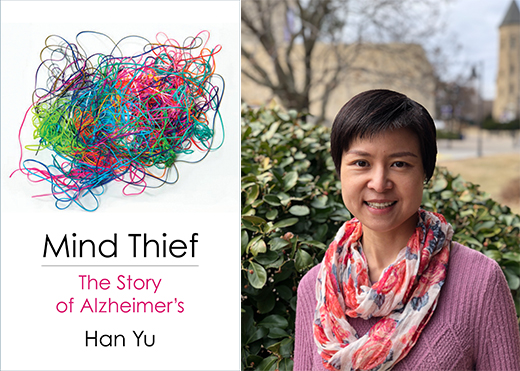New book tells story of Alzheimer's disease
Wednesday, Feb. 24, 2021

"Mind Thief" is a new book by K-State Professor of English Han Yu exploring the history of Alzheimer's disease. | Download this photo.
MANHATTAN — The first patient with what is now known as Alzheimer's disease, the most common form of dementia, died in 1906. More than 100 years later, there is no treatment or cure.
"Mind Thief," a new book from the Columbia University Press by Han Yu, professor of English at the Kansas State University College of Arts and Sciences, explores the history of the disease and the vast research taking place to find a cure.
In "Mind Thief," Yu's narrative begins with patient zero who was treated by Alois Alzheimer, for whom the disease is named, and follows through decades of patient suffering; political, social and cultural events that lead to an interest in the disease; and research and theories on the cause and potential cures for Alzheimer's disease.
"Alzheimer's wasn't really researched until the 1980s," Yu said. "It is almost like it became an overnight obsession, but it had been going on for decades and people were just not talking about it."
For Yu the book is personal as her uncle was diagnosed with the disease in 2006 and lived for 10 years with it. From her expertise in technical writing and science communication, Yu recognized science has all the elements for a good story including metaphors, drama and human conflict. From there she began shaping the complex story of Alzheimer's disease into "Mind Thief."
"The book is information-rich and it doesn't dumb down the science," Yu said. "It also has cultural, historical and philosophical bents throughout. Science is not just about doing lab experiments and crunching numbers. It's about the people doing the science, it's about the people in clinical trials and it is about the historical context."
Yu said she wanted to write a book that will give Alzheimer's patients and their loved ones perspective on how much work, imperfect as it may be, is being done to find a cure.
"Scientists, drug companies and clinical trial participants really go through a lot of struggle and pain to find a cure," Yu said. "I think the book will give patients and their families some perspective that people are trying to help and the disease is something bigger than themselves. For some, when you don't have a treatment or a cure, perspective is the best thing you can get."
According to the Alzheimer's Association, more than 5 million Americans currently live with Alzheimer's disease.
